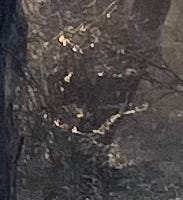Hello Competeers! We’re back with another regular-track post. If you’re seeing this post first, consider going back to the beginning. Author-recommended reading-order is chronological.
Most of the attributes I’ve described in this series are ones that strike me as appearing in most or all of the “big-C” Competent people I’ve observed in my life. I’m describing what I believe to be a base set of skills, behaviors, and personality traits that add up to a level of competence that goes beyond being “good at something” (or even many somethings). Today I’d like to tell you about someone with a defining trait that arguably doesn’t fit that lowest-common-denominator set. When I sat down to think about it I saw a bit of it in most of my exemplars, but I can’t confirm it’s alway’s present. To my mind, having this attribute makes the rest stronger. If it’s an enhancement, it’s the first one to add beyond the base set.
We’re into attributes now that are challenging to describe. Which is why I use people to illustrate them. Austin, however, is himself a challenge to reduce to a few-page description. So fair warning, good luck with this one. Happy to discuss in comments!
We’re still in the “martial arts years” of my timeline (technically most of the years, but a distinct storyline inserted arbitrarily). Austin is a martial arts friend.
As a serious martial artist, one of my biggest failings is being a serious martial artist. No matter how much I see a better way, when push comes to shove (pun intended) there’s a mindset for learning and practicing martial arts that works better, and a mindset that works less well. The better one doesn’t come naturally to me.
The one that works better I think you’ve seen in lighthearted masters in movies and (if you follow MA) in real life. The ones who laugh at mistakes, shake it off, don’t take errors to heart, maybe ones who see martial arts or even all of life as a game where you just shrug and handle whatever happens to flow in your direction. Uncle Iroh is a good example, if you’re a Last Airbender fan. Or Jackie Chan, showing off his goofs in the credits.
In contrast, consider the stubborn, determined, scrunch-faced student with a singular focus on the thing they’re learning. Miserable. Unable to let go. Maybe training to the point of injury to force themselves to master a technique. (Zuko?) Those characters are object lessons.
It’s easy to see how the better mindset can make learning or using almost any other skill easier right?
Austin is a shining example of that. Austin has intensity and determination. He studies deeply anything he puts his mind to learning. And he doesn’t allow outcomes to keep him down. I’ve watched him study martial arts, and been around for some tough academic accomplishments he’s undertaken as well. He’s shown (and to the extent my thick skull could allow it in) taught the better way to learn.
This easygoing quality is what I think of as the Buddhist concept of “non-attachment.” (Please understand that I mean my own feeble understanding of that concept. I am not an authority.)
Detachment would be not caring, and Austin cares. Thoroughly. He is detailed to a fault. Attachment would be caring in an ineffective way. Being so focused on the outcome that you screw up the journey (yo!). Non-Attachment as I’m framing it here is bringing a kind of lightheartedness along. Grasping gently. Doing things as well as possible, but when they don’t work, just letting that go and picking up fresh as if it’s the first try. Maybe even seeing the lesson of failure as “an opportunity” as folks usually only pretend it is out of embarrassment.
Austin is someone who has trained in my primary art for much longer than I have, though he’s quite a bit younger than I am. He was away, only an occasional presence at the school for several of my early years of training, then he returned to the area and became an important constant for quite a while.
Austin is the friend you call first for a whacky scheme. Not a stupid one, not an unfunny prank, not anything that would hurt or harm…but if it’s weird, call Austin, he’ll want in. I always chuckle at “Keep Austin Weird” stickers, because no concern on that score.
When you are being trained well in a contact form of martial arts, expect to have the dynamic of senior students and instructors letting you “find your way” to correct technique by getting gradually better at it. A hint here, a correction there, and many years of trying.
What this looks like in my experience is senior folks “allowing” a technique to work with increasing expectation of skill. It is usually true that someone senior can decide whether a technique by someone junior will work. Whether that’s because the junior isn’t doing it well and really won’t work unless the uke (receiving partner) “helps it along” or because their technique is awesome, but someone senior can counter it. Any success in between is the senior’s choice. There’s a universe of nuance in every technique. A throw you nailed yesterday isn’t good enough today and you end up on the floor. Time for improvement.
Bad training situations come in at least a couple of flavors. One of those is when the student never learns to catch enough of this light-touch attitude I’m trying to describe. Without some willingness to fail unexpectedly, monofocus on the outcome, self-recrimination when a senior partner decides “nope.” Those make it hard to see the nuance, the next improvement. Heck, they make it hard to have fun!
Good training, where techniques don’t always work, can be so frustrating that people give up. Or they get emotionally (or physically) broken. Some schools or teachers, ones more focused on income, solve this by trying to offer instruction without much failure. Just a string of false-confidence-building successes. Other teachers are bad judges and maybe cause too much failure. Some schools have a culture of misery where seriousness and pain are considered the only paths to success. I think we’ve seen that in many sports. Olympic gymnastics and skating come to mind.
Where this attribute of non-attachment appears is in the student’s mind, and the teacher’s example. A good teacher can show it and a student might emulate it. A student keeping cheerful in the face of failure, a teacher laughing with them. It’s related to “beginner’s mind,” which we’ve addressed earlier. Being able to learn as if it’s the first time with a wide-open clean slate. But where that I described as “curiosity.” A constant thirst for learning. This non-attachment I would describe as an infectious sense of fun.
If I was analogizing Austin to a fictional character it would be Bugs Bunny. Mischievous, energetic, always one (or more) step(s) ahead of the frustrated antagonist. Easygoing, open to oddity, and enjoying himself. Life is good. Carrots abound. On the mat, that translates to someone who could try a technique, fail miserably, and bounce right up after a picture-perfect roll to avoid injury. Ready to try again. He’d analyze what went wrong, but with a non-attached scientific interest, not a self-loathing hatred of “failure.” In free response, Austin has a blast, and it’s evident when you watch. He loves an unexpected technique. Loves it whether he’s just shocked a training partner by popping up where he shouldn’t be able to be, or laughing out loud when another student pulls a great technique out of thin air. He still tells a story about being a public demonstration partner to a much-senior woman, who caught him totally flat-footed. Left standing stock-still mid-attack, astonished. He was delighted.
Being on the “junior” side of Austin, to me he was a pretty constant source of “not letting my techniques work” for a long while. As someone not so great at a light touch when it comes to failure, that was super hard for me. I grasped the importance of it. I had the mindset of wanting only correct technique to work, so I “appreciated” it, but dang it was miserable. A self-inflicted misery. Even with many years of watching Austin enjoy himself while learning, I was not quick on the uptake.
Over the years I’ve known Austin, and the years before that that I know of Austin (he was one of the earliest students in our school), he’s handled some of the most serious and difficult things life can inflict on a person. In spite of loss, pain, and plenty of obstacles in life and training, Austin keeps a cheerful face to the world. I believe reflects a cheerful underlying attitude.
Austin is both smart and knowledgeable. He studies our art deeply. The history as well as the real-world use of it. He’s made a point of studying with every possible senior instructor available to him. He pursues them doggedly to really grasp what they have to teach. Sometimes to the point of their frustration. But always with a sense of mischief, of fun.
I’ve been fortunate to be able to include regular individual lessons with instructors into my training. For about three years Austin volunteered to join those lessons as a combination training partner and second instructor. (Consider what sort of awesome …Competent?…person would do that.) So I had the opportunity to get an up-front view of “easygoing doesn’t mean it’s easy.”
Thinking of this in the context of Competence, being able to hold that balance of “this is not the end of the world” non-frustration can enhance many of the other skills we’re discussing here. An infectious sense of humor. Laughing with people to help them through frustration and pain. Not following sunk costs to project failure. Seeing inevitable messes as something to laugh about and move on from. In Austin’s case, his demeanor probably has saved him innumerable swats from authority. Austin is a stickler for detail. He holds himself to high standards, so people higher in the org chart ought to be even more knowledgeable and skilled right? He’s “well actually” man, but his attitude makes clear the goal is mutual clarity and correctness, not an insufferable sense of superiority. Austin knows a lot of things, and wants for you to know the things too. Like Bugs Bunny, he will dance effortlessly around your feeble flailing on any ground he knows well. Like Bugs, if you laugh and dance along, there’s always fun to be had.
I’m not certain that this skill, an easygoing sense of humor, a lightness of grasping, Loki-like mischief, is an essential fundamental quality of Competence. But it might be. I’ll posit that Competent people find fun in most areas of life. Can’t hurt, might help right?




